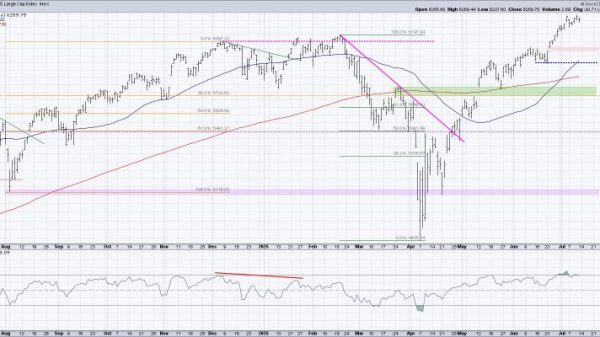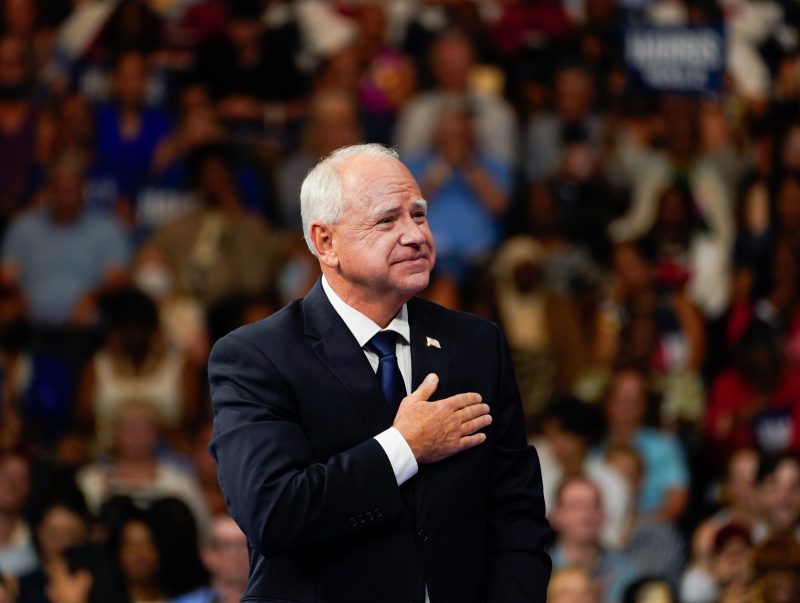Tim Walz was weighing a life-altering decision when he stepped into a supply room at the National Guard Armory in New Ulm, Minn., nearly two decades ago. He closed the door behind him, recalled a colleague, Al Bonnifield, and confided he was considering whether to leave their unit even though it was preparing to go to war so he could run for Congress.
“It was a very long conversation behind closed doors,” said Bonnifield. “He was trying to decide where he could do better for soldiers, for veterans, for the country. He weighed that for a long time.”
Walz, 60, ultimately chose to leave the Guard in 2005 and went on to win a House seat the following year, unseating a Republican incumbent as a populist wave of opposition to the Iraq War lifted Democrats to a majority of both chambers of Congress. That jump-started a political career that saw him elected governor of Minnesota in 2018 and, this week, selected as Vice President Kamala Harris’s running mate in a heated race for the White House.
But while Walz and his political allies have cited his 24 years of military experience as an asset, the circumstances of his departure from the National Guard and his characterization of his service already have come under attack. At least three former Guard colleagues have publicly voiced bitterness at Walz’s decision to leave their unit at such a consequential moment. It’s not clear how widespread that feeling was, but the Trump campaign has moved quickly to capitalize on the issue.
“Nobody wants to go to war. I didn’t want to go, but I went,” Doug Julin, a retired National Guard soldier who worked with Walz, said in an interview. “The big frustration was that he let his troops down.”
The Harris campaign did not address criticisms from fellow soldiers that he retired to avoid going to war. Instead, the campaign said that while in Congress he was a “tireless advocate for our men and women in uniform.” As vice president, the campaign said in a statement to The Washington Post, “he will continue to be a relentless champion for our veterans and military families.”
Walz, a native of West Point, Neb., enlisted in the Nebraska Army National Guard at age 17. His father served during the Korean War era, and urged both him and his sister to enlist, Walz said during a 2009 interview for an oral history project by the Library of Congress. Walz shifted to the Minnesota Army National Guard in 1996 after relocating with his wife, Gwen. He was activated for a variety of missions, including responses to forest fires, tornadoes and flooding.
On Wednesday, Walz also came under scrutiny for saying during a gubernatorial campaign event in 2018 that “we can make sure those weapons of war that I carried in war” are not on America’s streets. Walz did not serve in combat, according to the Minnesota Army National Guard, and his Republican counterpart jumped on those comments.
“He said we shouldn’t allow weapons that I used in war to be on America’s streets,” JD Vance, the Republican vice-presidential candidate, said during a campaign event in Michigan. “Well, I wonder. Tim Walz, when were you ever in war?”
The Harris campaign, in response to those comments, said in its statement to The Post that Walz carried, fired and trained others how to use “weapons of war innumerable times.” It declined to address why Walz claimed incorrectly to have done so in war.
“Governor Walz would never insult or undermine any American’s service to this country — in fact, he thanks Senator Vance for putting his life on the line for our country,” the statement said. Vance, a Marine Corps veteran, served in Iraq in a noncombat role for six months beginning in fall 2005.
Walz and his political allies also have inaccurately described him as a retired command sergeant major, one rank higher than he holds in retirement. Walz himself did so in a video clip from 2006 that was surfaced by C-SPAN on Tuesday and in a 2018 clip posted on his own YouTube account.
“I’m a retired sergeant major in the Army and the Army National Guard,” he told a group of voters in the latter video.
Though Walz did achieve the rank of command sergeant major, it was a provisional rank until he completed required coursework for senior leaders, National Guard officials said. He did not do so by the time he departed the military and his retirement rank reverted to master sergeant on May 15, 2005, officials said. Walz retired the next day.
The Harris campaign declined to address why Walz has inaccurately said he retired as one. He has sometimes called himself a “former command sergeant major,” which is accurate.
Walz, asked by the oral-history interviewer where his combat experience occurred, said initially that his unit — the 1st Battalion, 125th Field Artillery — had served “throughout the European theater with Operation Enduring Freedom,” the name the Pentagon used to describe the war in Afghanistan and other counterterrorism assignments.
Walz clarified later in the interview that he and his fellow Guard members initially thought they would fire artillery, but later learned they would be assigned in Europe to backfill other U.S. troops who were going to war.
“I think in the beginning, many of my troops were disappointed,” Walz said, recalling how he was assigned in Vicenza, Italy. “I think they felt a little guilty, many of them, that they weren’t enough in the fight up front as this was happening.”
But Thomas Behrends, a retired command sergeant major who also was on that deployment, said it was very clear that their unit was not going to war.
“He’s sugarcoating it to make it more than it was,” Behrends said. After 9/11, he added, the Air Force realized it needed to better safeguard its airfields and requested the National Guard to assist.
“That was the mission from the get-go,” Behrends said. “There was nothing ever said about going to combat.”
Behrends has been a vocal critic of Walz’s since at least 2018, when he and another Guard member, Paul Herr, placed a scathing letter to the editor in a local newspaper, the West Central Tribune, that accused Walz of exaggerating his military career for years as he ran for governor.
“He failed his country. He failed his state. He failed the Minnesota Army National Guard, the 1-125th Field Artillery Battalion, and his fellow Soldiers,” Behrends and Herr wrote. “And he failed to lead by example. Shameful.”
Behrends, who replaced Walz as the unit’s command sergeant major, has donated to Republican political causes in the past. In 2022, he promoted a petition on his Facebook page demanding that Walz resign as governor, posting a photo of a grain silo — Behrends is a farmer — festooned with the phrase “Walz is a traitor!”
He also stood next to Walz’s gubernatorial opponent, Republican Scott Jensen, at a campaign event that year and donated $2,500 to Jensen’s campaign, records show. He acknowledged in an interview Wednesday that he has made political donations in the past and said they were not about politics. He went on to call Walz “as far left as they come,” and said he can’t speak to whether other candidates are lying, but does know “for a fact that Tim Walz is lying about his record.”
“I always thought he was somebody that talked too much,” he said of their time serving together. “It was like, ‘God, could he just sit down and shut up?’ But he liked to hear himself talk, the same as he does now.”
Joe Eustice, who served in the National Guard with Walz for at least a decade, said he vehemently disagrees with Walz’s politics but described him as a good soldier. In an interview, he rejected assertions that Walz avoided combat duty. In late spring 2005, when Walz said he wanted to pursue politics and decided to retire, there was only speculation of a combat deployment on the horizon, Eustice said.
“Other than having a rumor, we were not notified that we were going to be deployed,” Eustice said.
The unit received an official alert order two months after Walz had retired, the Minnesota National Guard said, which helped the unit prepare for mobilization later in the fall.
Walz, when asked by the Library of Congress historian about his retirement, said that he did so to run for Congress, adding that he was concerned about trying to serve in the military and run for office simultaneously. He also cited worries about the Hatch Act, which restricts partisan political activity by federal employees.
Julin, who oversaw Walz as a more senior command sergeant major, said that Walz approached him in 2005 and said he was prepared to go on their upcoming deployment to Iraq, but also was interested in running for Congress. Julin said he thought “no big deal” because other members of Congress had deployed.
But a couple of months later, Julin learned from another member of the Guard that Walz had retired. Julin was frustrated, he said, because Walz had arranged his retirement with two officers who outranked Julin.
“I would have analyzed it and challenged him,” Julin said. “It would have been a different discussion, but he went to the higher ranks. He knew I would have told him, ‘Suck it up, we’re going.’”
Bonnifield, who listened as Walz pondered his future nearly 20 years ago, said the future politician appeared then to have no fear about the possibility of danger.
“He was not that kind of man,” said Bonnifield. “Absolutely not.”
The deployment to Iraq turned out to be grueling for their unit, which was deployed to Camp Scania, a way station between Baghdad and Kuwait constantly targeted by insurgents with rockets and other long-range fire, Bonnifield said. On the day their deployment was supposed to end, he said, it was extended an extra six months. The soldiers were away from home for a total of 22 months, he said, and multiple people died.
Bonnifield, who described himself as a Democrat willing to vote across party lines, said he thought Walz made the right career decision. He later voted for Walz, whom he said he has spoken to only once since, during a chance encounter at a political event.
“If I had the same choices, I probably would have done the same thing,” he said.
Patrick Murphy, the first Iraq War veteran elected to Congress, met Walz on Capitol Hill in 2006 during their orientation as freshman lawmakers, Murphy said in an interview. They quickly bonded while rooming together in a modest apartment on Capitol Hill, he said.
Both felt the Iraq War was a disaster, and Walz said he believed he could do more as a policymaker to avoid such conflicts rather than deploy again, Murphy recalled. While Walz did not see combat, his service in Italy still meant leaving his family behind.
“We have yanked these citizen-soldiers around for the last two decades,” Murphy said. “The Pentagon, the Army, they pick where you go. You don’t get the chance to go where you want.”
Walz served on the House Veterans’ Affairs Committee and pushed for the repeal of Don’t Ask, Don’t Tell, the Pentagon’s policy at the time that prevented gay service members from being open about their sexuality. He also supported in 2008 the Post-9/11 GI Bill, legislation that provided far more generous education support than the previous benefit.
Vance has credited the expanded benefits for his ability to attend Yale Law School. Vance should thank Walz for that, Murphy said, “instead of criticizing him for his military record.”
Nicole Markus and Aaron Schaffer contributed to this report.





























